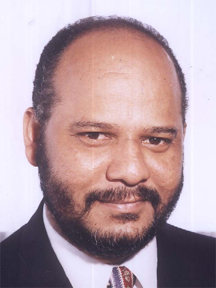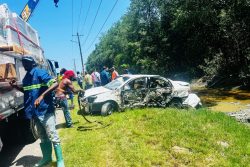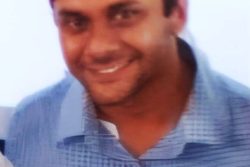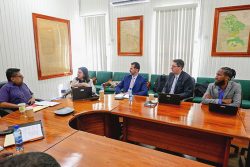Labelling the 2010 US State Department International Narcotics Strategy Report (INCSR) on Guyana a falsehood, Minister of Home Affairs Clement Rohee yesterday also knocked the report’s praise of CANU while it rubbished efforts by government to combat drug trafficking. He said it was “downright deceptive and misleading.”

Rohee, speaking at a press conference, said the report had nothing new except for the “usual and few grudging plaudits sprinkled here and there in the text of the document.”
The report had singled out the Customs Anti Narcotics Unit (CANU) for praise and had said its head James Singh-who was not named-was delivering on promises of regularisation of its operations, improved efficiency, and enhanced collaboration among law enforcement bodies.
However, Rohee pointed out that CANU was an integral part of the government’s institutional arrangements to fight drug trafficking. “CANU is part and parcel of the task force on illicit drugs and illegal firearms established to enhance coordination and cooperation among law enforcement agencies in Guyana as called for in the National Drug Strategy Master Plan,” the minister said.
He said it is not CANU that is delivering but rather it is “the all-round efforts of the government, through the Ministry of Home Affairs and the collective actions of the Task Force that have resulted in these positive developments.”
He debunked many of the claims made by the report stating that its fundamental objective was to put the government in a bad light and to make it appear that the government “turns a blind eye to or is supportive of drug trafficking activities in Guyana.”
The report, among other things, had said that bribes and coercion see Guyana’s dons continuing to operate with impunity despite some strides made by local law agencies in investigating drug crimes. It had also said that the country continues to be a major transshipment point for cocaine destined for North America, Europe and West Africa and “the GOG [Government of Guyana] has neither identified nor confronted major drug traffickers and their organisations.”
But the home minister said as long there is evidence, “we are committed to pursuing both major and minor drug dealers…”
‘92% completed’
Minister Rohee insisted that most of what the government had set out to do in its 2005-2009 National Drug Strategy Master Plan was achieved.
The INCSR report released on Monday had knocked the country for achieving few of the original goals spelled out in the plan.
“Elaborate plans were spelled out in the 2005 document envisioned a comprehensive, country-wide counternarcotics programme yet little action was taken towards these ends,” the report had said.
However, Rohee told media representatives that a mid-term review of the programme done in 2008 found that 70% of the plan was implemented at that stage. This conclusion was drawn by all the relevant stakeholders who were involved in the review process, he added.
According to the minister the plan is arranged under four broad areas and contains 36 programmes and a more recent review of the implementation of the plan done by the Task Force on Narcotics and Illegal Weapons indicated that 17 of the 36 programmes have been completed.
Sixteen of the programmes have commenced and are in progress while only three have not been fully started but are under focus, the minister revealed.
“The task force this concluded that 92% of the programmes under the master plan have been implemented,” Rohee said.
“The Minister of Home Affairs continues to reject any notion that Guyana has not been doing enough to counter narcotics in the country,” the minister emphasised.
‘Long on words’
Accusing the US administration of being “short on action and long on words”, the minister said mixed signals are emanating from that country to the world at large by the legalising of marijuana in several states and encouraging marijuana shops.
He echoed President Bharrat Jagdeo’s sentiment that Guyana is not inclined to be “part of any ‘Banana Republic’ relationship” and urged the establishment of a real partnership based on equity, mutual respect and understanding.
According to the minister, this country has done much more than the US in the fight against drug trafficking and he gave the example of all the law officers involved in the drug fight being polygraphed, coupled with interdiction activities being intensified on all fronts.
“Government continues to expend significant sums of money to fight this scourge at the level of both demand reduction and supply reduction,” the minister emphasised.
And in response to criticism that the country has not been attending regional drug meetings, Rohee listed several meetings on drugs the country attended last year and others it has been attending over the years.
Meanwhile, when asked about steps taken by the government to curb the inflow of drugs through the country’s porous borders, Rohee emphasised the need for the communities located along the borders to work with law enforcement agencies in providing information. “They [residents of the communities] are there all the time… they know the geography, they know the local conditions, so we have to develop as we have done – and as we have to do better – relationships and cooperation with communities that live on the borders of these countries where we suspect drugs are penetrating from,” the minister said.
He said the residents are “very important sources of information gathering” but the challenge they have is the fact that law enforcement at present does not exist in all of the communities.
The minister said this challenges all for innovation and improvisation as the reality is that the country cannot afford a “military presence at each kilometre of the borders between Guyana and Brazil, these are very extensive borders…”
Not only persons cross over by foot and in vehicles but they also use air and water all of which pose major challenges for Guyana and many other countries where drugs enter through the borders.
According to the minister some of the innovative measures are working as the law enforcement agencies from time to time receive information from the local population about over-flights, planes landing at illegal airstrips and other forms of information.
However, when asked if the information has resulted in seizures and interdictions, the minister said: “Well we may not see that. We may not see that but the fact of the matter is you have to keep working on it.
My position is you can have deficiencies but you can’t just throw back and say what am I going to do. You have to keep working on it.”
He said the work includes international collaboration and he mentioned that law enforcement officers from Guyana and Brazil meet once a year.
And the minister announced that he would be meeting next Tuesday in Guyana with the Justice Minister of Suriname who would be leading a nine-member team to this country. The delegations would discuss and review what they decided on at their first such meeting held in Suriname in 2008.
“All of that is part of the sum total of the collaborative effort to deal with this issue. We cannot deal with it alone. So you have to deal with it, you have to cooperate with your neighbours and that’s what we are doing. You have to work with the local community…, you have to use the conventional law enforcement bodies that are trained to deal with these matters,” the minister said.








